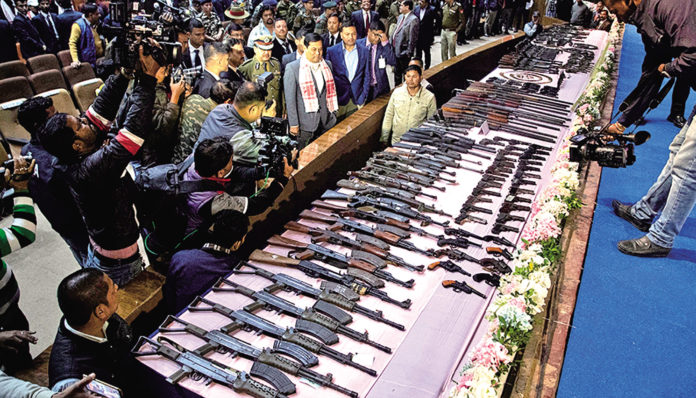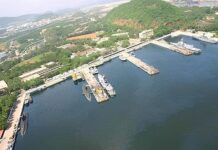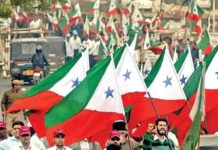
In one of the largest surrender of militants in Assam, a total of 644 cadres of eight insurgent groups formally laid down arms on 23 January. This was one of the largest surrender of militants in recent history.
The members of the insurgent groups – United Liberation Front of Assam -Independence (ULFA (I)), National Democratic Front of Bodoland (NDFB), Rava National Liberation Front (RNLF), Kamatapur Liberation Organisation (KLO), Communist Party of India (Maoist) (CPI (M)), National Santhal Liberation Army (NSLA), Adivashi Dragon Fighter (ADF) and NLFB – joined the mainstream in front of Assam Chief Minister Sarbananda Sonowal at a programme in Guwahati, Assam.
The surrendred militants came to a unilateral ceasefire between 2015 and 2019. These groups were not related to NDFB (S) militants, who declared ceasefire earlier in January 2020.
Almost half of them (301) were from a little-known Bengali group – National Liberation Front of Bengali (NLFB), followed by 178 from ADF and 87 from the NSLA.
The others who surrendered included 50 cadres of the ULFA(I), eight militants of the NDFB, six insurgents of the KLO, 13 members of the RNLF and one CPI (M) militant.
Besides 177 arms, the militants also laid down 58 magazines, 1.93 kg explosives, 52 grenades, 71 bombs, three rocket launchers, 306 detonators, two RT sets and 17 khukris.
Suspension of Operations by NDFB
The National Democratic Front of Bodoland (Saoraigwra) or NDFB (S) had joined the peace process and signed a tripartite Suspension of Operations (SOO) Agreement with the central government and Assam government on 16 January. NDFB (S) became the signatory entity to the proposed comprehensive Memorandum of Settlement with the Bodo organisations in order to accelerate the peace process.
The SOO agreement states, “National Democratic Front of Boroland (NDFB), under the leadership of B Saoraigwra agreed to abjure violence, come overground and join the peace process by being a signatory to the proposed comprehensive Memorandum of Settlement with Bodo organisations.”
The tripartite SOO Agreement was signed by the Front president, B Saoraigwra, Commissioner & Secretary, Home & Political, Assam, Ashutosh Agnihotri and Joint Secretary (Northeast), Ministry of Home Affairs, Satyendra Garg.
During the agreement signing event, BR Ferrenga, general secretary of NDFB(S) and two mediators Rajkumar Prithviraj Narayan Dev Mech and Thulunga Basumatary were also present.
Director general of police Bhaskar Jyoti Mahanta appealed to former NDFB leader Songbijit Ingti Kathar and its prominent members B Bidai and Batha, who are still at large, to join the peace process. The Sixth Schedule of the Constitution was implemented to create the Bodoland Territorial Council (BTC) in 2003 after a political accord with erstwhile militant outfit Bodo Liberation Tigers, leading to BLT cadres joining the political mainstream. However, NDFB under the leadership Ranjan Daimary did not give up violence.
The Saoraigwra faction is the third group of NDFB to initiate peace talks with New Delhi. Earlier in 2005, the NDFB (Progressive) faction signed a ceasefire agreement with New Delhi. Over 3,000 members of NDFB (P) are currently housed in three government-approved designated ceasefire camps in Udalguri, Baksa, and Kokrajhar districts of Assam.
Rehabilitation Programme
Assam has a rehabilitation programme for surrendered militants in place. They get financial assistance from the government and can also avail of a bank loan to start a business or invest the money in farming or entrepreneurship, according to officials.
A screening committee comprising the civil administration, the police, the Army and other security agencies decide the eligibility for rehabilitation package. There have been reports of non-extremists becoming beneficiaries in order to show a certain number of “surrendered militants”.
Inactive Outfits
South Asia Terrorism Portal, which keeps track of militant outfits and their activities classified NLFB and ADF as inactive outfits while it classified NLSA among outfits who are in peace talks or ceasefire.
According to Kamal Pal, the former chief of the NLFB, the group was formed in Kokrajhar district in 2011 in reaction to “atrocities against the Bengalis including how they were being marked as doubtful voters and put in detention camps.”
The group gave up arms in December 2015 and was hopeful that the members would be rehabilitated by the current government.
Stop Press
The government signed an accord, on 27 January, with the National Democratic Front of Boroland (NDFB) providing political and economic bonanza and a move that is expected to boost peace in the Northeast, which has been spearheading a movement for a Bodoland state. The tripartite agreement was signed with the representatives of factions of banned organisations, NDFB, All Bodo Students’ Union (ABSU), and Assam government in the presence of Union Home Minister Amit Shah and Assam Chief Minister Sarbananda Sonowal.
The pact provides political and economic bonanza to the tribals, sans the outfit’s key demand of a separate Bodoland state or union territory.
Union Home Minister Amit Shah said, 1,550 cadres along with 130 weapons will surrender on January 30.
This is the third Bodo accord to be signed in last 27 years when the violent movement for a separate Bodoland state claimed hundreds of lives, destruction of public and private properties. The first Bodo accord was signed with the All Bodo Students Union (ABSU) in 1993, leading to creation of a Bodoland Autonomous Council with limited political powers. In 2003, the second Bodo accord was signed with the militant group Bodo Liberation Tigers (BLT), leading to formation of a Bodoland Territorial Council (BTC) with four districts of Assam – Kokrajhar, Chirang, Baska and Udalguri — called the Bodoland Territorial Area District (BTAD).
The BTC has control over 30 subjects like education, forests, horticulture but no jurisdiction on the police, revenue and general administration departments, which are controlled by the Assam government.

















